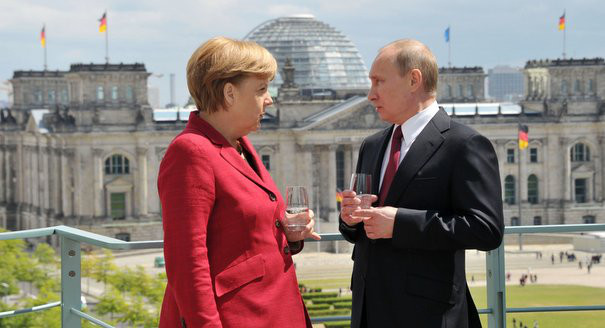Meeting Russian President Vladimir Putin is not one of German Chancellor Angela Merkel’s favorite official duties. She likes neither his KGB past nor his current, authoritarian policies.
This coming Sunday, however, Merkel has no choice but to accompany Putin during the traditional opening tour of the annual Hanover Fair. Russia is the fair’s “partner country” this year. That is quite an honor—and a surprise, given Russia’s rampant corruption, poor business practices, and miserable human rights record.
Russian officials and the Ost-Ausschuss, the German industry lobby that (uncritically) promotes business in Russia and Eastern Europe, are already praising the Kremlin’s economic policies ahead of the Hanover event.
Yet Germany, as Russia’s most important trading partner in Europe, should take the lead in establishing a new long-term strategy toward Russia. That strategy should no longer distinguish between interests and values. In the case of Russia, the two are inextricably linked.
German and European interests and values include supporting a democratic and prosperous Russia. Germany’s business community and politicians believe that the modernization of the Russian economy will eventually lead to the democratization of the country. So far, however, that hasn’t happened.
“Modernization has been so disappointing,” says Lars Peter Schmidt, director of the Konrad Adenauer Foundation’s Moscow office.
The Russian authorities last month raided the foundation’s offices in St. Petersburg. When asked what policies Germany should adopt in response, Schmidt replied: “Critical engagement. That means dialogue. We have to keep talking,” he told Carnegie Europe.
But with whom?
This is where Germany and the rest of the EU could make much more of an effort to reconcile interests and values. Instead of depending almost exclusively on the Kremlin as an interlocutor, European leaders should reach out to individuals, civil society movements, and prodemocracy organizations. At the same time, they need to do more to explain Europe’s values to the wider Russian public. That is what Western foundations active in Russia are trying to do, too.
Of course, Putin does not want this kind of dialogue. He takes the mere existence of nongovernmental organizations (NGOs) in his country as an insult and a threat. Look at how he has been hounding NGOs over the past few weeks. It is as if Putin were inventing a new Cold War in order to justify the Kremlin’s current power structures.
So far, the EU has stood admirably firm in its criticism of Putin and his attempts to rein in NGOs. A leader from Eastern Europe who attended a recent EU summit in Brussels was surprised about the unanimous criticism of Putin. “There is a change taking place inside the EU,” the leader said. “None of us has any illusions anymore about Russia under Putin.”
That is all very well. But if Germany and Europe really want to be effective about defending Western interests and values vis-à-vis Russia, they will need the support of industry. So far, the German business community remains indifferent.
Yet German industry has a very real interest not only in speaking out against corruption, but also in countering Russia’s rapidly deteriorating environmental, health, and life-expectancy standards. These are areas where it is becoming clear to even the most hard-nosed Western investor how closely linked interests and values have become.
The Hanover Fair presents an ideal opportunity to address this issue in public. Merkel, having completed the tour of the fair with Putin, should seize this chance to explain that investing only in interests, at the expense of values, will not modernize Russia. And given her tense relationship with the Russian president, she might even enjoy the moment.




-1.png)

-1.png)